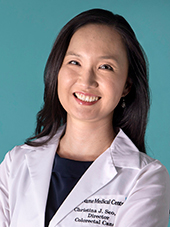Contact Us
Although colorectal cancer is still among the most common forms of cancer in the United States, the numbers are steadily declining – a direct result of effective screening. The best screening method is a colonoscopy, a routine exam that looks for changes in the large intestine (colon) and rectum, identifying any issues and allowing physicians to take action on the spot.
During a colonoscopy, a flexible tube with a light and small video camera on the end is used to observe and remove abnormal tissue growth or polyps, preventing the potential development of cancer.
This type of straightforward screening is so effective that physicians now recommend colonoscopies for patients under 45, depending on personal and family medical history.
Despite being simple and effective, the test still has a rough reputation due to the previous use of unpalatable liquid laxatives in preparation for the procedure, which have since been replaced by easier to digest alternatives.
"With the newer medications now available, there is less liquid to drink, and in some cases pills can be used instead," said Dr. Christine Seo, a colorectal surgeon at Holy Name. "It's important to remember, just one day of mild discomfort can help prevent colorectal cancer– so it's worth it."
Here's what to expect before, during, and after your colonoscopy:
- The prep begins a few days before your colonoscopy, when you should start eating a low-fiber diet. The day before the procedure, consume only liquids like clear soup broth, coffee or tea, juice (apple or white grape), sports drinks, Jell-O and popsicles. You can continue this up to two hours before your procedure, when you must stop eating and drinking completely.
- Depending on the time of your colonoscopy appointment, you will be instructed to take prescribed laxatives – either a liquid or pills – the afternoon or evening before the procedure. Closely follow your physician's instructions regarding the timing of the first and second and dose so that you are well-prepared.
- While you will have diarrhea for several hours, as long as you keep hydrated, you won't feel weak or ill, as you would with a stomach virus or food poisoning.
You aren't permitted to drive right after your procedure, so arrange for transportation to and from your appointment. Once you arrive, you will be sedated. (Some people say it's the best sleep they've had in years.) Your physician will begin the screening, which typically takes between 30 and 60 minutes to complete. Any polyps or abnormal tissue will be removed at this time.
"When you wake up, you may feel slightly bloated but there is no pain," Dr. Seo said. "Your physician will provide the results of your test right then, and after you leave, you can resume your normal daily activities, including eating."


